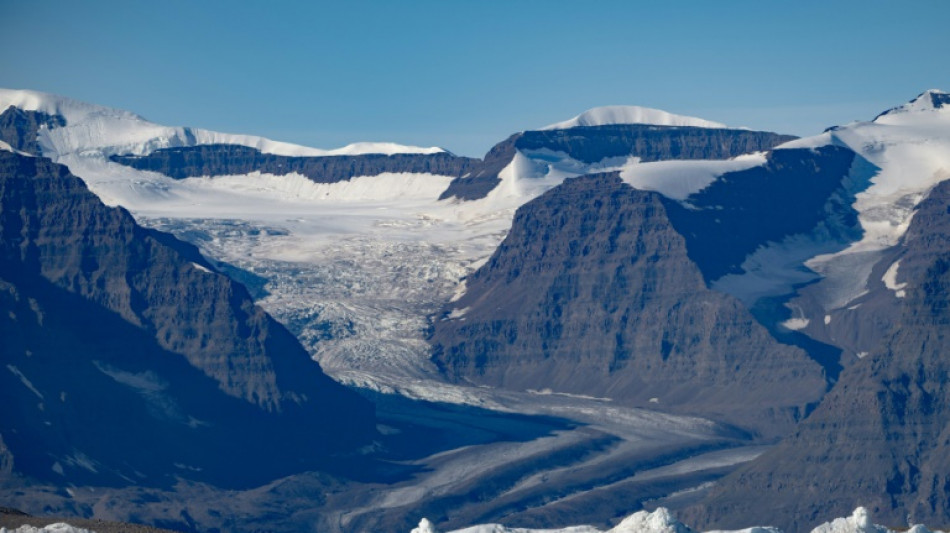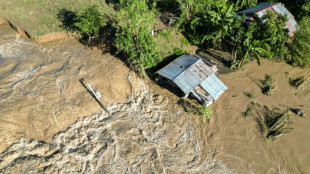
-
 Spain royals visit flood epicentre after chaotic trip
Spain royals visit flood epicentre after chaotic trip
-
France's Gisele Pelicot says 'macho' society must change attitude on rape

-
 G20 leaders talk climate, wars -- and brace for Trump's return
G20 leaders talk climate, wars -- and brace for Trump's return
-
US lawmaker accuses Azerbaijan in near 'assault' at COP29

-
 Tuchel's England have 'tools' to win World Cup, says Carsley
Tuchel's England have 'tools' to win World Cup, says Carsley
-
Federer hails 'historic' Nadal ahead of imminent retirement

-
 Ukraine vows no surrender, Kremlin issues nuke threat on 1,000th day of war
Ukraine vows no surrender, Kremlin issues nuke threat on 1,000th day of war
-
Novo Nordisk's obesity drug Wegovy goes on sale in China

-
 Spain royals to visit flood epicentre after chaotic trip: media
Spain royals to visit flood epicentre after chaotic trip: media
-
French farmers step up protests against EU-Mercosur deal

-
 Rose says Europe Ryder Cup stars play 'for the badge' not money
Rose says Europe Ryder Cup stars play 'for the badge' not money
-
Negotiators seek to break COP29 impasse after G20 'marching orders'

-
 Burst dike leaves Filipino farmers under water
Burst dike leaves Filipino farmers under water
-
Markets rally after US bounce as Nvidia comes into focus

-
 Crisis-hit Thyssenkrupp books another hefty annual loss
Crisis-hit Thyssenkrupp books another hefty annual loss
-
US envoy in Lebanon for talks on halting Israel-Hezbollah war

-
 India to send 5,000 extra troops to quell Manipur unrest
India to send 5,000 extra troops to quell Manipur unrest
-
Sex, drugs and gritty reality on Prague's underworld tours

-
 Farmers descend on London to overturn inheritance tax change
Farmers descend on London to overturn inheritance tax change
-
Clippers upset Warriors, Lillard saves Bucks

-
 Acquitted 'Hong Kong 47' defendant sees freedom as responsibility
Acquitted 'Hong Kong 47' defendant sees freedom as responsibility
-
Floods strike thousands of houses in northern Philippines

-
 Illegal farm fires fuel Indian capital's smog misery
Illegal farm fires fuel Indian capital's smog misery
-
SpaceX set for Starship's next flight, Trump expected to attend

-
 Texans cruise as Cowboys crisis deepens
Texans cruise as Cowboys crisis deepens
-
Do the Donald! Trump dance takes US sport by storm

-
 Home hero Cameron Smith desperate for first win of 2024 at Australian PGA
Home hero Cameron Smith desperate for first win of 2024 at Australian PGA
-
Team Trump assails Biden decision on missiles for Ukraine

-
 Hong Kong court jails 45 democracy campaigners on subversion charges
Hong Kong court jails 45 democracy campaigners on subversion charges
-
Several children injured in car crash at central China school

-
 Urban mosquito sparks malaria surge in East Africa
Urban mosquito sparks malaria surge in East Africa
-
Djibouti experiments with GM mosquito against malaria

-
 Pulisic at the double as USA cruise past Jamaica
Pulisic at the double as USA cruise past Jamaica
-
Many children injured after car crashes at central China school: state media

-
 Asian markets rally after US bounce as Nvidia comes into focus
Asian markets rally after US bounce as Nvidia comes into focus
-
Tens of thousands march in New Zealand Maori rights protest

-
 Five takeaways from the G20 summit in Rio
Five takeaways from the G20 summit in Rio
-
China, Russia ministers discuss Korea tensions at G20: state media

-
 Kohli form, opening woes dog India ahead of Australia Test series
Kohli form, opening woes dog India ahead of Australia Test series
-
Parts of Great Barrier Reef suffer highest coral mortality on record

-
 Defiant Lebanese harvest olives in the shadow of war
Defiant Lebanese harvest olives in the shadow of war
-
Russian delegations visit Pyongyang as Ukraine war deepens ties

-
 S.Africa offers a lesson on how not to shut down a coal plant
S.Africa offers a lesson on how not to shut down a coal plant
-
Italy beat Swiatek's Poland to reach BJK Cup final

-
 Japan, UK to hold regular economic security talks
Japan, UK to hold regular economic security talks
-
Divided G20 fails to agree on climate, Ukraine

-
 Can the Trump-Musk 'bromance' last?
Can the Trump-Musk 'bromance' last?
-
US to call for Google to sell Chrome browser: report

-
 Macron hails 'good' US decision on Ukraine missiles
Macron hails 'good' US decision on Ukraine missiles
-
Italy eliminate Swiatek's Poland to reach BJK Cup final


Oh my (long) days: Melting ice caps slow Earth's spin
It's well known that as far as the climate crisis goes, time is of the essence.
Now a study out Monday shows that the melting of the polar ice caps is causing our planet to spin more slowly, increasing the length of days at an "unprecedented" rate.
The paper, published in Proceedings of the National Academy of Sciences, shows that water flowing from Greenland and Antarctica is resulting in more mass around the equator, co-author Surendra Adhikari of NASA's Jet Propulsion Laboratory told AFP.
"It's like when a figure skater does a pirouette, first holding her arms close to her body and then stretching them out," added co-author Benedikt Soja of ETH Zurich.
"The initially fast rotation becomes slower because the masses move away from the axis of rotation, increasing physical inertia."
Earth is commonly thought of as a sphere, but it's more accurate to call it an "oblate spheroid" that bulges somewhat around the equator, a bit like a satsuma.
What's more, its shape is constantly changing, from the impacts of the daily tides that affect the oceans and crusts, to longer term effects from drift of tectonic plates, and abrupt, violent shifts caused by earthquakes and volcanoes.
The paper relied on observational techniques like Very Long Baseline Interferometry, where scientists can measure the difference in how long it takes for radio signals from space to reach different points on Earth, and use that to infer variations in the planet's orientation and length of day.
It also used the Global Positioning System, which measures Earth's rotation very precisely, to about one-hundredth of a millisecond, and even looked at ancient eclipse records going back millenia.
- Implications for space travel -
If the Earth turns more slowly, then the length of day increases by a few milliseconds from the standard measure of 86,400 seconds.
A currently more significant cause of slowdown is the gravitational pull of the Moon, which pulls on the oceans in a process called "tidal friction" that has caused a gradual deceleration of 2.40 milliseconds per century over millions of years.
But the new study comes to a surprising conclusion that, if humans continue to emit greenhouse gases at a high rate, the effect of a warming climate will be greater than that of the Moon's pull by the end of the 21st century, said Adhikari.
Between the year 1900 and today, climate has caused days to become around 0.8 milliseconds longer -- and under the worst-case scenario of high emissions, climate alone would be responsible for making days 2.2 milliseconds longer by the year 2100, compared to the same baseline.
That might not sound like a great deal, and certainly not something that humans are able to perceive.
But "there are definitely a lot of implications for space and Earth navigation," said Adhikari.
Knowing the exact orientation of Earth at any given moment is crucial when attempting to communicate with a spaceship, such as the Voyager probes that are now well beyond our solar system, where even a slight deviation of a centimeter can end up being kilometers off by the time it reaches its destination.
E.Flores--AT

